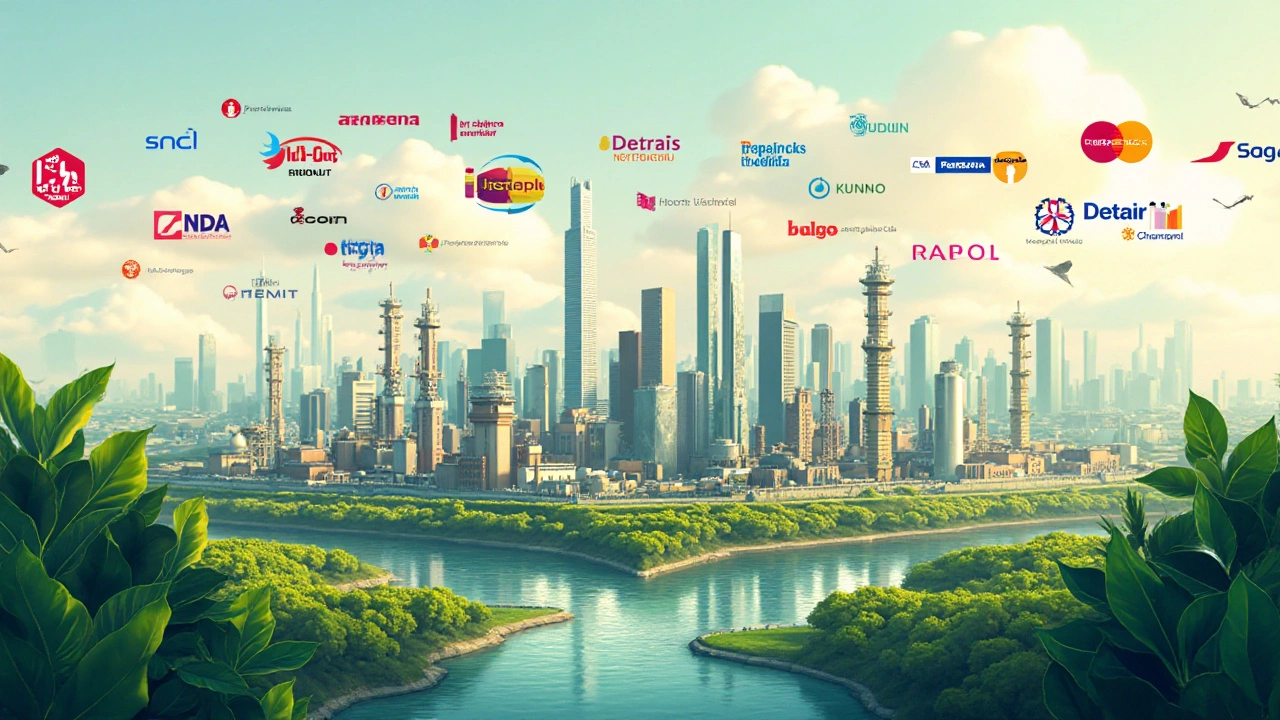The Indian chemical industry is nothing short of a powerhouse, acting as the backbone of numerous sectors ranging from agriculture to pharmaceuticals. With such a vast expanse, it raises the intriguing question: who wears the crown as the 'King of Chemicals'? In this exploration, we'll journey through the dynamic realm of Indian chemical manufacturers, spotlighting those who have carved a niche with groundbreaking strategies and robust production capacities.
From legacy firms with decades of influence to nimble newcomers charging forward, the competition is fierce and fascinating. Dive in as we unravel the tales of triumph and innovation that define India's chemical frontiers, all while considering the pressing aspects of sustainability and technology that shape their trajectory.
- The Chemical Landscape in India
- Leading Chemical Manufacturers
- Innovation and Growth Strategies
- Sustainability and Environmental Impact
- Future Prospects and Industry Trends
The Chemical Landscape in India
India, a vibrant nation rich in resources and innovation, stands tall as the world's third-largest producer of chemicals. Contributing significantly to the global chemical output, the Indian chemical industry spans numerous sectors, each undergoing extraordinary growth. This industry is not only pivotal to the domestic economy but also plays a crucial role in shaping global market trends.
Key Segments and Growth Drivers
The chemical industry in India is composed of several key segments, including petrochemicals, specialty chemicals, agrochemicals, and pharmaceuticals. Among these, the specialty chemicals sector is emerging as a frontrunner, driven by increased demand for high-performance materials and the rise of new applications. Growth in this sector alone is projected at a robust 12% CAGR over the next five years, fueled by advancements in technology and rising consumer awareness.
India's chemical industry is rapidly evolving with a focus on sustainability and innovation, making it a vital contributor to our nation's vision of self-reliance and global leadership.
Notably, the petrochemical segment, deeply intertwined with the nation's energy policies, remains essential for manufacturing crucial materials like fertilizers and synthetic fibers. Innovations and government initiatives to modernize production processes highlight this area’s future potential.
Government Policies and Initiatives
The Indian government plays an active role in bolstering this industry's expansion, introducing policies to facilitate ease of doing business and attract foreign investments. One striking initiative is the 'Petroleum, Chemicals and Petrochemicals Investment Regions' (PCPIRs), aimed at fostering large-scale industrial investments in specific zones. This has ushered in greater foreign participation, enhancing India's production capabilities and competitive edge.
The Sustainability Angle
As the industry expands, a spotlight on sustainability becomes vital. Many Indian manufacturers are spearheading programs to reduce carbon footprints, investing in renewable energy sources, and adopting zero-waste technologies. Such efforts not only mitigate environmental impacts but also align with international standards, positioning Indian companies favorably in the global arena.
A look ahead further illustrates promising trends. With the integration of digital technologies and a committed push for sustainable practices, the industry’s landscape is likely to witness transformative shifts. This bodes well for consolidating India's status as a formidable leader in the chemical industry globally, cementing its position as not just a participant, but an influencer of the world's chemical symphony.
Leading Chemical Manufacturers
The Indian chemical industry is a tapestry woven with numerous players, each bringing its unique flair and expertise. The landscape is dominated by a few towering giants, whose innovations and efficiencies have placed them on a global map. Let's embark on a journey to uncover these key frontrunners.
Reliance Industries Ltd.
A household name in India, Reliance Industries is a formidable force in the chemical sector. Through its extensive petrochemicals division, it churns out a wide array of products from polymers, elastomers, to olefins. Reliance's Jamnagar complex is one of the world's largest refining complexes, a testament to India's aspirations of being a global chemical hub.
Key Highlights:
- Operates the world's largest integrated refining complex in Jamnagar.
- Strong focus on backward integration and state-of-the-art technology.
Tata Chemicals Ltd.
Tata Chemicals is renowned for its sustainability-driven approach, centering on the balanced growth of its chemical production capabilities. Its prominence is in the manufacture of soda ash and sodium bicarbonate, vital components in many consumer products. Tata has also stepped into the arena of specialty chemicals to cater to green technologies.
Key Focus Areas:
- Strong commitment to sustainable practices and environmental stewardship.
- Innovation in consumer and specialty chemicals.
BASF India Ltd.
As a subsidiary of the German multinational BASF SE, BASF India has made significant strides in the Indian chemical industry, offering a plethora of solutions spanning from agriculture to automotive. Their cutting-edge research and constant innovation position them as a leader in bridging traditional practices with forward-thinking technologies.
Strategic Advantages:
- Highly diversified product portfolio across various sectors.
- Robust R&D framework enhancing product innovation.
UPL Ltd.
Under the canopy of agrochemicals, UPL Ltd. shines brightly with a widening footprint across continents. Its broad-spectrum offerings in crop protection and seed technologies underscore its pivotal role in supporting the global agricultural chain.
Noteworthy Insights:
- One of the top five agrochemical companies globally.
- Consistently expanding global reach and market access.
| Company | Core Products | Revenue (2023) |
|---|---|---|
| Reliance Industries | Polymers, Elastomers | $92 billion |
| Tata Chemicals | Soda Ash, Specialty Chemicals | $3 billion |
| BASF India | Plastics, Coatings | $2 billion |
| UPL Ltd. | Agrochemicals, Seeds | $5.7 billion |
These top chemical companies not only drive India's economic engine but also shape global trends in the industry. With continued investment in technology and sustainability, they remain at the forefront of leading change and progress.

Innovation and Growth Strategies
The Indian chemical industry has witnessed a remarkable transformation, driven largely by the innovative strategies employed by its leading players. This evolution is not merely a result of expansion but is rooted in a commitment to research and development, technological advancement, and sustainability. The top chemical manufacturers in India are not just keeping pace with global trends; they are setting benchmarks by intelligently leveraging their inherent advantages.
Investing in Research and Development
One of the most striking features of successful Indian chemical companies is their substantial investment in R&D. Companies like Tata Chemicals and Reliance Industries have allocated significant portions of their budgets to cultivate cutting-edge chemical processes and products. These efforts not only enhance their product offerings but also improve efficiency and cost-effectiveness, providing them with a competitive edge.
Case in Point: Reliance Industries
A prime example is Reliance Industries, which has rapidly scaled up its chemical production through sophisticated innovations. By focusing on polymer production technologies and eco-friendly practices, Reliance has fortified its leadership position both domestically and internationally.
Strategic Collaborations and Acquisitions
Another pillar of growth for Indian chemical companies lies in strategic collaborations. Firms are increasingly forming alliances with global players to access advanced technology and international markets. Additionally, acquiring niche companies allows them to tap into new segments and fortify their dominance in existing ones.
For instance, UPL Limited, a leading agrochemical producer, has expanded its foothold by acquiring Arysta LifeScience. This acquisition has strategically positioned UPL to enhance its product range and global distribution network.
Sustainability as a Growth Lever
In recent years, sustainability has transformed from a narrative into a crucial growth strategy. Indian chemical companies are embracing eco-friendly processes and products, responding to the regulatory demands and the growing eco-conscious consumer base. Firms like Godrej Industries are pioneering in sustainable practices by integrating green chemistry principles across their production lines.
Focus on Sustainable Solutions
Godrej has been recognized for its plant-based and biodegradable product spectrum, which caters to a diverse clientele seeking environmentally friendly alternatives. This not only reinforces the company's market standing but also contributes to its sustainability goals.
| Company | R&D Investment (% of Revenue) |
|---|---|
| Reliance Industries | 5% |
| Tata Chemicals | 3.8% |
| UPL Limited | 4.5% |
As Indian chemical producers advance further, these innovation and growth strategies will undoubtedly serve as the keystones of their success. With an eye firmly fixed on sustainability, technological advancement, and strategic partnerships, these companies are well-poised to continue their impressive trajectory.
Sustainability and Environmental Impact
In the race to be the king of chemicals in India, addressing sustainability and environmental impact is not just a mere choice but a necessity. As the world's third-largest chemical producer, India is acutely aware of the environmental implications that accompany such a title. With rapid industrial growth come significant challenges in managing emissions, waste, and energy consumption.
Green Chemistry Initiatives
Several leading chemical manufacturers in India are championing green chemistry principles. These initiatives aim to reduce hazardous substances and minimize the potential for environmental harm. For instance, Tata Chemicals has pioneered eco-efficient processes that not only reduce waste but also optimize resource usage. Their Mithapur facility, notably, uses soda ash production waste to create low-cost, sustainable building materials.
Sustainable Practices and Innovations
Companies like Reliance Industries are leveraging technology for sustainable innovations. By utilizing biotechnology, they convert biomass into biofuels, thus reducing dependence on traditional fossil fuels. This aligns with the national goal of reducing carbon footprints and fostering green energy alternatives.
Regulations and Compliance
India's regulatory framework plays a vital role in steering the chemical industry toward sustainability. The government mandates stringent compliance with environmental norms, pushing companies to adopt cleaner technologies. The recent introduction of policies favoring renewable energy adoption further encourages industries to shift towards greener practices.
Environmental Impact Statistics
Environmental sustainability efforts have shown measurable improvements over the years. According to estimates, the adoption of energy-efficient practices in India's chemical sector has led to a reduction in CO2 emissions by approximately 20% over the past decade.
| Year | CO2 Reduction (in million tonnes) |
|---|---|
| 2015 | 5 |
| 2020 | 9 |
| 2025 | 12 |
In conclusion, while the path to complete environmental sustainability is ongoing and challenging, India's chemical industry is undeniably progressing. By integrating innovation, stringent regulation, and a commitment to sustainability, the sector is striving to balance growth with ecological responsibility—a crucial step for those vying to be recognized among the top chemical manufacturers globally.

Future Prospects and Industry Trends
As the global demand for chemicals surges, the Indian chemical industry stands at the cusp of an exciting era. With a compound annual growth rate (CAGR) projected to reach around 9% from 2020 to 2025, the sector is poised for robust expansion. This growth trajectory is propelled by factors like increasing urbanization, a burgeoning population, and evolving consumer preferences.
Emerging Opportunities
India’s strategic position as a manufacturing hub attracts increased investment from both domestic and international stakeholders. The government's emphasis on ‘Make in India’ and ease of doing business has facilitated infrastructural advancements, providing a solid foundation for chemical manufacturers in India to flourish. Additionally, the rise in specialty chemicals catering to specific industries such as personal care, textiles, and agrochemicals presents niche opportunities that promise high margins.
Technological Advancements
The integration of technology is revolutionizing production processes within the industry. Digitalization, automation, and AI-driven analytics are transforming everything from supply chain management to predictive maintenance of equipment. These advancements not only yield cost efficiencies but also bolster product quality and consistency, giving Indian producers a competitive edge in the global arena.
Sustainability and Green Chemistry
With growing awareness about environmental impact, sustainability has become a core focus. Initiatives towards green chemistry are gaining momentum as manufacturers aim to minimize waste and reduce carbon footprints. Investing in renewable raw materials and energy-efficient processes is no longer optional but essential to retaining market relevance.
Regulatory Framework
The regulatory landscape continues to evolve, with increased emphasis on compliance and safety standards. For chemical manufacturers in India, navigating this complex web requires agility and foresight. Compliance with international standards ensures smoother trade operations and enhances credibility on the world stage.
Global Economic Dynamics
Global trade patterns are pivotal in shaping industry trends. The ongoing shifts in geopolitical climates demand resilience and adaptability. Diversifying export markets and forging strategic alliances will be crucial for companies seeking to mitigate risks associated with economic fluctuations and trade tariffs.
In summary, the future of the Indian chemical industry shines brightly with abundant prospects. The convergence of innovation, sustainability, and strategic foresight will dictate who claims the title of the true king of chemicals, driving the nation towards a more sustainable and prosperous horizon.
